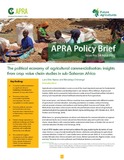| dc.contributor.author | Naess, Lars Otto | |
| dc.contributor.author | Chinsinga, Blessings | |
| dc.coverage.spatial | Ethiopia | en |
| dc.coverage.spatial | Ghana | en |
| dc.coverage.spatial | Malawi | en |
| dc.coverage.spatial | Nigeria | en |
| dc.coverage.spatial | Tanzania | en |
| dc.coverage.spatial | Zimbabwe | en |
| dc.date.accessioned | 2022-04-28T11:12:25Z | |
| dc.date.available | 2022-04-28T11:12:25Z | |
| dc.date.issued | 2022-04-01 | |
| dc.identifier.citation | Naess, L.O. and Chinsinga, B. (2022) The Political Economy of Agricultural Commercialisation: Insights from Crop Value Chain Studies in Sub- Saharan Africa. APRA Brief 34. Brighton: Future Agricultures Consortium, DOI: 10.19088/APRA.2022.020 | en |
| dc.identifier.isbn | 978-1-78118-972-6 | |
| dc.identifier.uri | https://opendocs.ids.ac.uk/opendocs/handle/20.500.12413/17353 | |
| dc.description.abstract | Agricultural commercialisation is seen as one of the most important avenues for fundamental structural transformation and development in sub-Saharan Africa, and is assumed to help enhance a wide array of household welfare indicators among rural households whose livelihoods directly derive from agriculture. Over recent years, sub-Saharan African countries have experimented with different models of agricultural commercialisation but, while there have been some success stories, the performance track record of agricultural commercialisation has generally been dismal. While there is a growing literature on drivers and obstacles for commercialisation at regional and national levels, less is known about how these factors play out in particular value chains, where there is still a need to better understand what drives or hinders the success of commercialisation. A set of APRA studies were carried out to address this gap, exploring the dynamics of crop value chains as a way of understanding the drivers, obstacles and pathways to agricultural commercialisation. A total of 11 case studies were carried out over 2020–21 in six countries, namely Ethiopia (rice), Ghana (oil palm and cocoa), Malawi (groundnuts), Nigeria (maize, cocoa and rice), Tanzania (rice and sunflower) and Zimbabwe (tobacco and maize). This briefing paper summarises some of the key findings from these studies. | en |
| dc.language.iso | en | en |
| dc.publisher | APRA, Future Agricultures Consortium | en |
| dc.rights.uri | http://creativecommons.org/licenses/by-nc-nd/4.0/ | en |
| dc.subject | Agriculture | en |
| dc.subject | Development Policy | en |
| dc.subject | Economic Development | en |
| dc.subject | Participation | en |
| dc.subject | Politics and Power | en |
| dc.subject | Rural Development | en |
| dc.title | The Political Economy of Agricultural Commercialisation: Insights from Crop Value Chain Studies in Sub-Saharan Africa | en |
| dc.type | Series paper (non-IDS) | en |
| dc.rights.holder | APRA, Future Agricultures Consortium | en |
| dc.identifier.team | Rural Futures | en |
| dc.identifier.doi | 10.19088/APRA.2022.020 | |
| dcterms.dateAccepted | 2022-04-01 | |
| rioxxterms.funder | Department for International Development, UK Government | en |
| rioxxterms.identifier.project | APRA | en |
| rioxxterms.version | VoR | en |
| rioxxterms.versionofrecord | 10.19088/APRA.2022.020 | en |
| rioxxterms.funder.project | e1f6d3be-457a-4f13-8b1f-6748d1402d83 | en |


